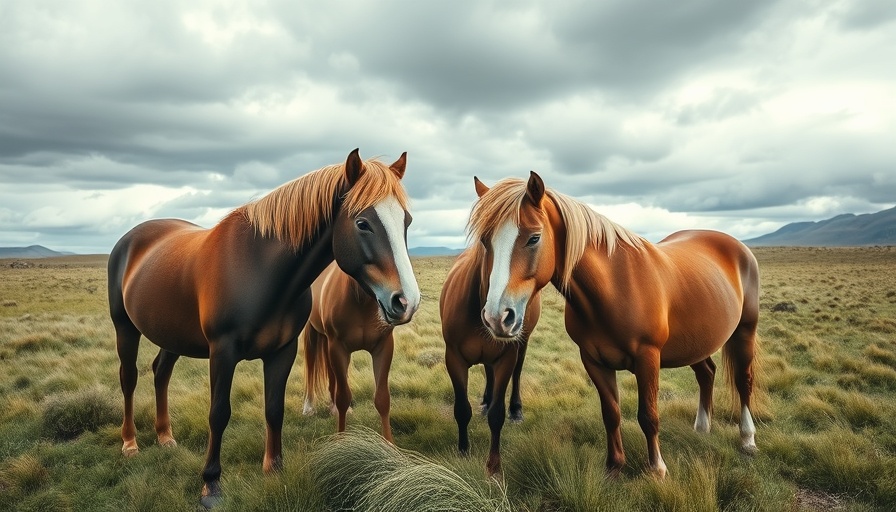
Unraveling the Secrets of the Icelandic Horse
The Icelandic horse, a symbol of Icelandic culture, stands out not just for its unique history but also its incredible adaptability and friendly demeanor. As one of the oldest horse breeds in the world, tracing its origins back to around 900 BCE during the Viking Era, it has captured the hearts of equestrians far beyond its homeland, showcasing a perfect blend of beauty and utility.
Guardians of an Ancient Breed
Due to the breed's geographical isolation, Icelandic horses have remained one of the purest horse breeds, shielded from many outside influences and diseases. This isolation protects them biologically, as there are strict regulations—such as no imports of horses and even bans on importing horse gear—ensuring that they remain as authentic as possible. It's almost like a living museum of equine history!
A Snapshot of the Icelandic Horse
- Height: 13–14 hands (52-56 inches)
- Weight: 730–840 pounds
- Lifespan: Up to 30 years
- Colors: Various, predominantly black, bay, chestnut, and gray, with unique features like blue eyes.
These horses are not only admired for their physical characteristics but are also known for their adaptability to various riding styles, making them a favorite among families and novice riders. Their friendly nature and instinct to bond make for a remarkable companionship.
Wellness and Care of Icelandic Horses
Caring for an Icelandic horse tends to be straightforward due to their hardiness. Regular veterinary check-ups and preventive care are essential in maintaining their health. Interestingly, Icelandic horses do not usually require vaccinations in their homeland because they reside in a near-sterile environment, making them less susceptible to diseases that plague horses elsewhere.
However, if they venture outside of Iceland, they may face new health challenges and must adhere to vaccination requirements based on their new environment. This highlights the importance of regular care, particularly for horses that are exported.
Potential Health Issues and Risks
Despite their robust nature, Icelandic horses are not immune to certain health issues. One notable ailment is sweet itch, a form of allergic reaction to insect bites, particularly from the Culicoides genus, which are not found in Iceland. When these horses are transported out of their secluded environment, they may develop symptoms like intense itching, skin scaling, and painful lesions during particular seasons when the insects are active. It’s crucial for owners of Icelandic horses outside of Iceland to remain vigilant about this risk and provide suitable care.
A Cultural Connection to Icelandic Horses
The relationship between Icelandic people and their horses transcends mere ownership; it’s steeped in cultural significance. For centuries, these horses have played vital roles in Iceland's economy and personal lives, used for farming, transport, and even as a source of pride in traditional events. Engaging in equestrian culture is an important social activity that connects people to their heritage and land.
This breed has not only endured through the ages but also serves as an ambassador for Iceland's unique environment and traditions, symbolizing resilience and beauty. Beyond their practical usage, Icelandic horses create bonds among communities, bringing people together through shared stories and experiences.
Embracing the Future with Icelandic Horses
As the world expands, so does the reach of the Icelandic horse breed. They have found their way into homes across the globe, capturing hearts and introducing people to the joys of horse riding. Whether you are considering welcoming an Icelandic into your life or simply curious about these remarkable creatures, it's essential to understand their needs and the lifestyle that best suits them.
Having an Icelandic horse is not just about owning an animal; it is an experience filled with learning, joy, and connection. With proper care, these horses can thrive and provide countless hours of pleasurable riding experiences that strengthen the bonds between humans and animals.
The Icelandic horse encapsulates the spirit of adventure and companionship. For those intrigued by their majestic appeal and vibrant culture, there’s no better time to explore this enchanting breed.
Owning, caring for, and learning about Icelandic horses can be a fulfilling journey. Engage with your local equestrian community, visit farms that specialize in these horses, or take a riding lesson to immerse yourself in their world. You'll not only support the breed but also connect with a network of enthusiasts who share your passion.
 Add Row
Add Row  Add
Add 


Write A Comment